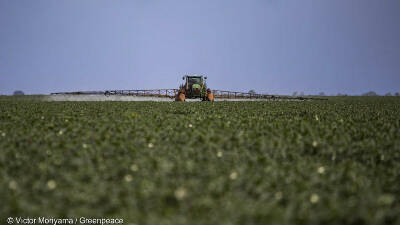Protect FAO from corporate capture
New report sheds light on how corporate actors engage with the UN’s World Food Forum
Ahead of World Food Day, FIAN International joins social movements, Indigenous Peoples’ and civil society groups, calling for an end to growing corporate influence at the UN’s Food and Agriculture Organization.
In a new report, FIAN International and Corporate Accountability shed light on the extent of this influence over the UN’s World Food Forum (WFF), taking place in Rome next week, starting on Monday, World Food Day. The report also highlights the need for a robust accountability framework for corporate actors.
The WFF is billed by the FAO director general as “the world event on food and agrifood systems issues, with a strong focus on youth, private sector partnership and investment, and science and innovation”.
However, this year the event is clearly dominated by corporate-driven narratives, the cooptation of youth participants, and an FAO drive to broker problematic public and private investment partnerships. The FAO also significantly chose to shift the dates of a major meeting of the more inclusive UN Committee on World Food Security from World Food Day, in favor of the WFF, a move which was opposed by many countries and grassroots groups.
Corporate food systems
“The WFF is an essential part of a broader FAO strategy. An unprecedented comprehensive open-door policy to corporate actors has become an institutional priority of the FAO in recent years,” says FIAN Secretary General Sofia Monsalve.
“The FAO’s leadership consistently promotes the consolidation and expansion of corporate-driven, industrial food systems.”
The WFF is primarily led by the FAO with the support of young entrepreneurs, startups, and youth groups. Many groups listed as Cooperation Partners have close ties to corporations.
One of the key findings of the report is that 40 percent of the WFF’s so-called Cooperation Partners have some form of corporate relationship: 18 of the 44 Cooperation Partners had at least one link to food, agrochemical, pharmaceutical, or technology industries. Sixteen Cooperation Partners (over a third) have multiple and overlapping relationships with corporate-backed organizations.
WFF partners and sponsors, particularly those closely involved in the Hand-in-Hand Initiative (HIHI), its Investment Forum, and the Science and Innovation Forum, appear to share a common narrative and a predilection for technological innovation and global value chains. They appear to be more aligned with private investors than social actors.
“What we urgently demand instead, together with other organizations, is to ensure that the FAO, as a key UN institution, is bound to the public interest,” says Angela Carriedo from Corporate Accountability, the lead author of the report.
“We call on Member States and the FAO leadership to prevent and reverse increasing corporate influence through a robust accountability framework for corporate actors,” adds Ashka Naik, Director of Corporate Accountability.
“This should include effective safeguards against conflict of interest, clear rules for the ways of engagement, and full transparency about any financial or programmatic relationships the FAO has with corporate or philanthropic interests.”
Read the full report in English here.
For more information or media interviews please contact Tom Sullivan, FIAN International Communications and Campaigns: sullivan@fian.org


